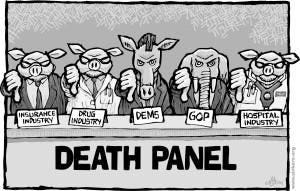Mises on Death Panels (Implicitly)
Unlike most opponents of Medicare, I think that restricted reimbursements and so-called “death panels” are great ideas. If the government is paying the bills, saying “We’ll pay for whatever you want” or “We’ll pay whatever it takes to save you” is highly imprudent. I recently discovered that Ludwig von Mises elegantly stated the same point back in 1952:
[T]he manager of a bureaucratic operation issues instructions on many things which appear unnecessary to the businessman–how often to clean the offices, how many telephones to have, how many men to watch a certain building, and so forth. These detailed instructions are necessary because in a bureaucracy what has to be done and what has not to be done must be determined by such rules. Otherwise the man on the spot would spend money without giving heed to the total budget. If there is a limited budget you must tell the employees what they can and what they cannot do. This refers to all branches of government administration.
This is bureaucracy, and in these areas it is indispensable.You cannot leave it to the individual employee; you cannot tell a man, “Here is a big hospital. Do what you want with it.” A limit is drawn by the parliament, the state, or the union and, therefore, it is necessary to limit the money spent in each department.
If it seems cold-blooded to put a price on another person’s life, remember that each of us puts a price tag on our own lives every time we drive to the store or cross the street.
The post appeared first on Econlib.



The fundamental problem is that we don't pay people to die.
Let's say you're in the hospital. You're in agony and the doctor offers you something that probably won't work and if it does won't extend your life very long. Right now you are presented with two options.
1) Let the government pay a bunch of money on free stuff for you
2) Save the government some money
I mean I'm not surprised that people pick #1. Sometimes their own suffering is enough to end it but they don't think about the money even when it's hundreds of thousands of dollars.
By contrast if turning down end of life Medicare expenses left money to your descendants I think a lot of people would pick #2. But we don't offer it because its uncomfortable socially.
If Mises thought only government bureaucracies had spending rules and budget limits, it just clarifies that he never worked for a private business. Under any system, there have to be limits to care. Do we trust civil servants? Politicians? Corporate executives? Hedge fund managers? Private equity? It's not obvious to me that transferring responsibility for such decisions to private businesspeople operating under incentives to increase ROI would provide better outcomes. Or cheaper ones.